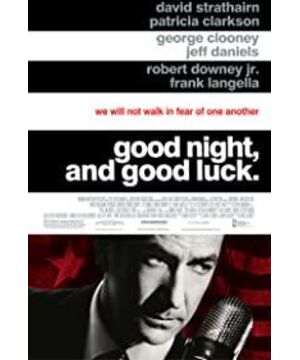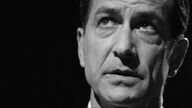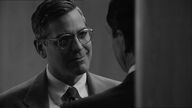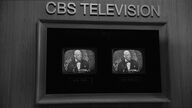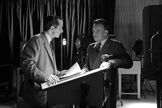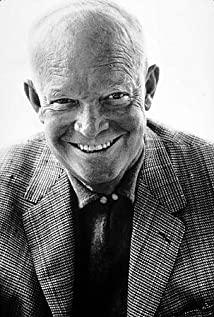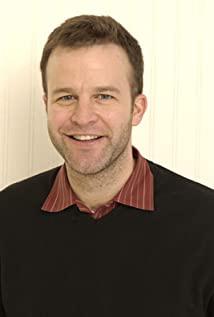While the Bush administration looms, under various names constantly interfere with US public opinion, strengthen media control, when the implementation of the "Patriot Act", "Warner Independent production company" launched an offbeat film "Good Night, and Good Luck" (Good Night ,and Good Luck). As soon as this film was released, everyone found that its theme, style and rhythm were very different from those of current American films. The film reverses the Hollywood trend of entertainment and commercial interpretation of history. It tells the story of a TV news host half a century ago in a documentary style. In the 1950s, when the TV set first appeared in American families, Edward Murrow used this nascent media to fight fiercely against the notorious McCarthy, until the McCarthyism collapsed. As soon as this political history film was released in American theaters, it immediately received unanimous praise from the media. In the 78th Oscars competition in 2005, it won six categories including best picture, best director and best actor. Nominate. How can such a small, out-of-date film cause such a sensation? Why did a news event that had been scrambled more than 50 years ago arouse attention again? Do people reflect on the current situation of American society from the history of McCarthyism?
"Good Night, Good Luck" is a meticulously produced black and white film, directed by George Clooney to create the atmosphere of the 1950s. Although it is completely an indoor play, the whole film has no location, but the director is still working hard on details and character modeling. In the film, the staff of CBS TV station is busy on the old typewriters of the 1950s, the secretary is carrying a large roll of film (not video tape) through the hall, and a black female singer in the recording studio sings melancholic blues. Starring David Strassen (the policeman who just starred in "Blueberry Night") is even more elaborately dressed, with meticulous, slick black hair, cigarettes one after another and never leaving his hand, green smoke Winding around, painting out leisurely. His role of Murrow is upright and personable, and he speaks in a circumflex, clear and powerful, unquestionable, robbing the audience of all sympathy and approval. And his rival, McCarthy, doesn't have to be played by actors at all. Because the director could not find a ready-made actor, he could grasp McCarthy's perverse image, and simply used the image data in the file and spliced it with the black and white lens of the film, resulting in a perfect and smooth effect. Almost no one can perceive the traces of splicing, and the film and historical archives are organically integrated. The most interesting thing is that the original image of McCarthy’s contra-angle is already very vicious and insidious. It does not require artistic processing, and it is enough to scare children into tears. Perhaps because McCarthyism has had a far-reaching impact on American society, American audiences are familiar with that period of history, so the film can directly lead the audience into the news war under the "red threat" without any explanation of the background. But for Chinese audiences, looking back at the ins and outs of McCarthyism may be even more interesting.
two
McCarthy is a Republican senator from Wisconsin. He was a chicken baby on a farm in the country as a child. At the age of nineteen, he went bankrupt due to a large-scale chicken disease and had to move to Manawa, a small town in Wisconsin, where he worked as a grocery store clerk and attended the local high school at the same time. From then on, he was admitted to law school with excellent grades, became a lawyer, and became the youngest circuit judge in Wisconsin at the age of 30. Later, his ambitions swelled and he worked hard on his official career without any means, and was finally elected to the Senate by a small majority in 1946. But in Washington, the center of the political whirlpool, he has always been a little-known little figure, and the media exposure rate is very low. In order to attract attention, he did not hesitate to stage a shocking political show. In February 1950, McCarthy gave an unstoppable speech at a gathering of the Republican Women's Group in Wheeling, West Virginia, stating that Secretary of State Acheson knew that there were 205 Communists working in the government, but he tolerated rape. Later it was said that there were eighty-one people, and finally it was reduced to fifty-seven people. The Senate immediately organized an investigation committee to conduct a careful investigation and found that McCarthy's allegations were false. It was time for a farce to end here, but in June of that year, the Korean War broke out, the anti-communist wave in the US media was raging, and the public was shrouded in red terror. Of course, McCarthy did not miss the opportunity, regardless of its basis, to continue to clamor for the alarm that communism has penetrated into the US government. The public's gaze suddenly turned to McCarthy this time, and the mood gradually turned from anger to fear. Secretary of State Acheson became the "red bishop of the State Department" at this time, and General Marshall, who formulated the "Marshall Plan" to revive Europe, was also denounced as a liar. People lost confidence in the government, friends and neighbors began to suspicion each other, and American social integrity was eroded.
In 1952, McCarthy took the lead and became the chairman of the government work committee and the chairman of the permanent investigation committee. He aggressively used newspapers and television propaganda to raise his profile, and attacked political opponents with vulgar and vulgar language. He has a classic McCarthyist logic: all those who disagree with him are the Communist Party, conspiring to subvert American democracy. Politicians, the media, and the public have remained silent for fear of being accused. Both Presidents Truman and Eisenhower have committed themselves to McCarthy. Eisenhower, a veteran who was once domineering on the battlefield of World War II, fell into a situation where he only dared to complain privately. But in 1954, a journalist with the courage, courage and conscience stood up-Edward Murrow used the naive television media to strategically seize an incident of the Qing Communist Party in the army and give it to McCarthy A powerful blow.
There is a veteran of World War II named Radović in the US Air Force. Just because his Serbian father and sister read Yugoslavian newspapers, he was suspected of being pro-communist. The military actually fired him. Murrow seized this incident and exposed the paranoia and madness of McCarthyism. He pointedly pointed out: "We should distinguish between what is different in political opinion and what is disloyal." The usual trick of McCarthyism is that the party is divided against each other, using people's fear of the red threat to eliminate political enemies from within and realize their political ambitions. McCarthy immediately fought back, repeating the same trick, and accused Murrow of taking Soviet money and working for the Communist Party. The boss of CBS Broadcasting Company was a little panicked, and the company's sponsors also put pressure on Murrow one after another. Everyone was afraid to annoy this "tyrant" and smash their own jobs. Murrow chose the call of conscience and continued to confront McCarthy. McCarthy not only intimidated the news media, but also had a notorious blacklist of Hollywood filmmakers. Many directors, actors and screenwriters were arrested, detained and interrogated. Ten people once invoked constitutional rights to remain silent, but were charged with contempt of Congress and sentenced to six months to one year in prison. In fact, many of them are not only indifferent to the Communist Party, but even their political inclination is not clear, just because their works are not in harmony with the mainstream American political culture.
Confused McCarthy made a fatal mistake when he was most mad. He reached out to the army and investigated the safety of top military officials. Obviously, he underestimated the strength of the military, thinking that he could do whatever he wanted in civilian society and the government, but he did not expect that he was not an opponent of the military at all. The military seized on a trivial matter and gave McCarthy a fatal blow and ruined him. One year ago (1953), McCarthy's right-hand man David Shain was drafted into the army, and McCarthy had asked the army to give Shain some care. The military was manipulated behind the scenes by President Eisenhower to expose the scandal. Although McCarthy was still invincible, and slandered the military for taking Sha as hostages to slander him, he never turned around at the "Military-McCarthy" hearing from April to June 1954. The whole process of the hearing was broadcast to the whole country on television, and the eloquence of the military lawyer Joseph Welch brought the hearing to a climax. He forced the embarrassed McCarthy: "Don't you know what shame is? Sir, don't you have shame?" McCarthy did not dare to look up at the other person, lowered his head and mumbled something. Although the hearing finally ended, McCarthy was completely discredited in front of the American people. Three years later, the infamous senator used alcohol to relieve his sorrows, and his alcoholism caused severe liver disease. He died in the Naval Hospital in Washington at the age of forty-eight.
three
The end of the film "Good Night, Good Luck" is a bit abrupt. After the scene of the "Military-McCarthy" hearing, the scene cuts back to the beginning of the film. It was 1958 after McCarthy's death. Murrow gave a famous speech at the Association of Radio and Television News Directors. He sternly refuted TV viewers’ lack of interest in ideological programs and warned that if the TV media can only be used to please, paralyze, and close the public, then the TV is just a box full of wires and tubes, and all our struggles will change. To be meaningless, completely failed. History has proved that although McCarthy has gone to the west, the specter of McCarthyism is still wandering deep in American culture. TV commentator Fulton Lewis once said: "For many Americans, McCarthyism is Americanism." McCarthy's own language is even more vivid. He once said to Wisconsin audiences in 1952: " McCarthyism is Americanism with arms and sleeves rolled up. "So, what exactly is Americanism? Obviously, it cannot be simply summed up with the "American Dream" that the mass media continues to exaggerate and romanticize, nor can it regard the democracy, freedom, human rights, and fraternity declared by the American founders on the Constitution as the true colors of the United States. From the Salem Witch Trials in the 17th century, to the apartheid at the end of the 19th century and the beginning of the 20th century, to the McCarthy horror in the 1950s, under the cloak of progress and openness, we saw another conservative, indifferent and quick success. , And even cruel clues, under a bright contrast of vibrant, vigorous, democratic and fair, it has become the background color of American tradition. It should be admitted that this young and uplifting nation also has a stubborn sophistication.
Although "Good Night, Good Luck" does not delve into the contradictions contained in American culture, it expresses a deep worry: Although the struggle against McCarthyism ends in joy, the next time Americans face a crisis again, it may not be so. Good luck. The film has deep concern for the moment. Fifty years later, the United States has once again encountered an unprecedented terrorist threat. Bush Jr. took advantage of the fears of Americans after 9/11, just like searching for the Communist Party in the canteen of the Pentagon and the printing room of government agencies, once again restricting the freedom of citizens. The U.S. government now mobilizes neighbors to report suspicious persons, monitors and monitors the phone calls and e-mails of international students, strictly censors news, and even advertises in newspapers to encourage Chinese Americans to expose Chinese spies. But the voice of criticism gradually weakened, and the media became more and more tame. The Bush administration used the lies of "weapons of mass destruction" to defraud the public to launch a war. However, the American media failed to criticize and expose the government's abuse of power and trample on constitutional traditions as it did in the 1960s and 1970s. In the 1950s, the American press was fortunate to have Edward Murrow, which finally bankrupted McCarthyism; in the 1970s, Bob Woodward and Carl Bernstein led to the fall of Nixon's autocracy. In the 21st century, there are no such media heroes in the United States, only dazzling celebrity hosts and high ratings that satisfy news tycoons.
If the American public has been indifferent to the nightmare of the McCarthy era, it is indeed unfair. However, McCarthy is at best a symbol today, an empty signifier that symbolizes evil, despotism, and reaction. People put all the injustices in contemporary American history under the label of "McCarthyism." It seems that once this unrecoverable notoriety is given, the conclusion can be made and everyone will be blameless. In his biography of McCarthy, Richard Rowell has this view: McCarthy is actually neither authoritarian nor reactionary, because these words should be used mainly at the level of social and economic systems, and McCarthy’s view of society , Economic and political ideas; if he must be described by a "ism", then McCarthy is more like a nihilist, a destructive force; in other words, he is a revolutionary without a revolutionary goal. A rebel with no purpose. But I prefer the sharp question of the lawyer Joseph Welch: Do you have any shame? Indeed, McCarthy is truly a shameless villain. The flaws of his personality made him use all means to achieve his goals. No matter how the political situation changes, and no matter which ideological trend is on the cusp, McCarthy all meet the wind and make waves. Therefore, human conscience and sense of justice are the bottom line of social behavior. Perhaps, this film also places hope on conscience, and in the increasingly worrying social situation, it wishes the United States: good night and good luck!
Wang Yan, a scholar, currently lives in Beijing. The main works include "After Auschwitz: The Image Production of the Memory of the Jewish Holocaust", "The Timeliness and Modernity of Novels-A Study on the Timeliness of the Narrative of European Growth Education Novels" and so on.
View more about Good Night, and Good Luck. reviews


